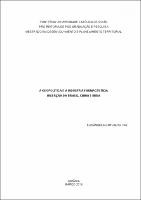| Compartilhamento |


|
Use este identificador para citar ou linkar para este item:
http://tede2.pucgoias.edu.br:8080/handle/tede/2846Registro completo de metadados
| Campo DC | Valor | Idioma |
|---|---|---|
| dc.creator | Vaz, Elisangela Carvalho | - |
| dc.creator.Lattes | http://lattes.cnpq.br/8555925300751753 | por |
| dc.contributor.advisor1 | Barbosa, Ycarim Melgaço | - |
| dc.contributor.advisor1Lattes | http://lattes.cnpq.br/9791745313665253 | por |
| dc.contributor.referee1 | Castro, Sérgio Duarte de | - |
| dc.contributor.referee1Lattes | http://lattes.cnpq.br/4171116066387278 | por |
| dc.contributor.referee2 | Linares, Carlos Henrique | - |
| dc.contributor.referee2Lattes | http://lattes.cnpq.br/3984155364352341 | por |
| dc.date.accessioned | 2016-08-10T10:50:18Z | - |
| dc.date.available | 2016-06-29 | - |
| dc.date.issued | 2016-03-15 | - |
| dc.identifier.citation | VAZ, Elisangela Carvalho. THE GEOPOLITICS AND PHARMACEUTICAL INDUSTRY: INCLUSION OF BRAZIL, CHINA AND INDIA.. 2016. 112 f. Dissertação (Mestrado em Ciências Exatas e da Terra) - Pontifícia Universidade Católica de Goiás, GOIÂNIA, 2016. | por |
| dc.identifier.uri | http://localhost:8080/tede/handle/tede/2846 | - |
| dc.description.resumo | Esta dissertação discute a geopolítica internacional a partir da inserção da indústria farmacêutica no Brasil, Índia e China. O segmento farmacêutico consolidou-se internacionalmente a partir da Segunda Grande Guerra, com a comercialização da penicilina. Foi a partir de 1945 que houve a reconfiguração deste setor em nível internacional com a presença dos Estados Unidos, a partir de alianças estratégicas entre a indústria farmacêutica, as universidades e novos centros de pesquisa especializados em engenharia genética e biotecnologia. O fortalecimento da indústria farmacêutica mundial ocorreu a partir do acordo TRIPs, que possibilitou o alicerçamento das grandes empresas multinacionais. A partir deste acordo o Brasil se reposicionou na indústria farmacêutica internacional, com a produção de medicamentos genéricos, no entanto, com significativa dependência tecnológica tanto em relação a importação de insumos farmacêuticos ativos, e de medicamentos de base biotecnológica. A indústria farmacêutica indiana desenvolveu-se através de restrições a importações, engenharia reversa na produção de medicamentos, mas com uma atenção especial a produção de princípios ativos farmoquímicos. A inserção da China no mercado farmacêutico mundial ocorreu a partir da importação e cópias de medicamentos de referência; atualmente lidera a produção e exportação de insumos farmacêuticos ativos, além de destacar-se como polo de atração para multinacionais, tanto para a fabricação de medicamentos de referência como genéricos. | por |
| dc.description.abstract | This dissertation discusses the international geopolitics from the inclusion of the pharmaceutical industry in Brazil, India and China. The pharmaceutical industry has established itself internationally from the Second World War, with the marketing of penicillin. It was from 1945 that there was a reconfiguration of this sector at the international level with the presence of the United States, from strategic alliances between the pharmaceutical industry, universities and new research centers specialized in genetic engineering and biotechnology. The strengthening of the global pharmaceutical industry occurred from the TRIPs agreement, which allowed the basis of large multinational companies. From this agreement Brazil is repositioned in the international pharmaceutical industry, with the production of generic drugs, however, with significant technological dependence both for the importation of active pharmaceutical ingredients, and biotechnology-based drugs. The Indian pharmaceutical industry has developed through import restrictions, and reverse engineering in the production of drugs, but with special attention to the production of active ingredients pharmaceutical chemicals. The inclusion of China in the global pharmaceutical market occurred from the import and copies of reference drug products; currently leads the production and export of active pharmaceutical ingredients, as well as stand out as a pole of attraction for multinationals, both for the production of reference drugs such as generics. | eng |
| dc.description.provenance | Made available in DSpace on 2016-08-10T10:50:18Z (GMT). No. of bitstreams: 1 ELISANGELA CARVALHO VAZ.pdf: 1517644 bytes, checksum: a6a18b8df4b7c15c3f9498e465cc08c7 (MD5) Previous issue date: 2016-03-15 | eng |
| dc.format | application/pdf | por |
| dc.thumbnail.url | http://localhost:8080/tede/retrieve/9119/ELISANGELA%20CARVALHO%20VAZ.pdf.jpg | * |
| dc.language | por | por |
| dc.publisher | Pontifícia Universidade Católica de Goiás | por |
| dc.publisher.department | Ciências Exatas e da Terra | por |
| dc.publisher.country | BR | por |
| dc.publisher.initials | PUC Goiás | por |
| dc.publisher.program | Desenvolvimento e Planejamento Territorial | por |
| dc.rights | Acesso Aberto | por |
| dc.subject | geopolítica | por |
| dc.subject | indústria farmacêutica | por |
| dc.subject | acordo Trips | por |
| dc.subject | políticas industriais | por |
| dc.subject | geopolitics | eng |
| dc.subject | pharmaceutical industry | eng |
| dc.subject | according Trips | eng |
| dc.subject | industrial policies | eng |
| dc.subject.cnpq | CNPQ::CIENCIAS SOCIAIS APLICADAS | por |
| dc.title | A GEOPOLÍTICA E A INDÚSTRIA FARMACÊUTICA: INSERÇÃO DO BRASIL, CHINA E ÍNDIA. | por |
| dc.title.alternative | THE GEOPOLITICS AND PHARMACEUTICAL INDUSTRY: INCLUSION OF BRAZIL, CHINA AND INDIA. | eng |
| dc.type | Dissertação | por |
| Aparece nas coleções: | Mestrado em Desenvolvimento e Planejamento Territorial | |
Arquivos associados a este item:
| Arquivo | Descrição | Tamanho | Formato | |
|---|---|---|---|---|
| ELISANGELA CARVALHO VAZ.pdf | 1,48 MB | Adobe PDF |  Baixar/Abrir Pré-Visualizar |
Os itens no repositório estão protegidos por copyright, com todos os direitos reservados, salvo quando é indicado o contrário.




